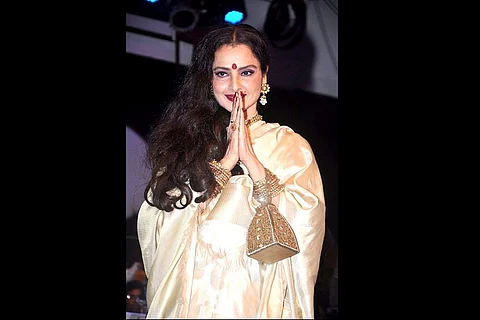

The first thing you have to know about this book is that Rekha, whose story it attempts to tell, was not involved in its writing. Yasser Usman, the author, says right at the beginning in his “Note” that despite his many attempts to meet Rekha and fix up an interview, the actor refused to take his calls.
So what we read is what Yasser Usman has pieced together from interviews that Rekha has given to magazines and tabloids earlier, and information given by sources from the film industry, critics and people known to her. The tale he tells, therefore, cannot be taken as the absolute truth as the validation for it hasn’t come from Rekha.
However, once that very necessary disclaimer is put in place, the book makes for an engaging read. The story begins with Mukesh, Rekha’s first husband, who committed suicide. It was a traumatic period in Rekha’s life and one that many in the industry took as an opportunity for some tarring and feathering.
Sample this statement that Anupam Kher, Rekha’s co-star in several films at that time, made about the suicide to “Stardust” magazine in November 1990: “She’s become the national vamp. Professionally and personally, I think it’s curtains for her. I mean I don’t know how will I react to her if I come face to face with her.”
Subhash Ghai claimed in an interview given to the same magazine: “No conscientious director will work with her ever again. How will the audience accept her as Bharat ki nari or insa ki devi?”
The book reveals that Mukesh suffered from depression and suicidal tendencies even before he married Rekha, thanks to a failed relationship. The narrative, from this low ebb in Rekha’s career, moves to her traumatic past – when she was Bhanurekha - and her entry into films as a teenager pushed to earn for her family.
Rekha’s journey is testament to the double standards, misogyny and exploitation that is characteristic of the film industry. In her first Hindi film, “Anjana Safar”, Rekha, who was not yet fifteen, was tricked into performing a liplock with the hero, Biswajeet. The director, Raja Nawathe, and the producer, Kuljeet Pal, connived with Biswajeet to take Rekha by surprise and kiss her on the lips when the camera started rolling.
This was molestation, plain and simple, but it created much needed publicity for the film and launched Rekha in Bollywood as the girl who’d go to any lengths on screen. It’s an image that Rekha grew to own and celebrate, even if she changed her version about her consent for the kiss, time and again.
Expectedly, a good portion of the book is devoted to the Amitabh Bachchan-Jaya Bhadhuri-Rekha love triangle that continues to incite gossip. However, there have been reams written about this over the years and considering none of the three people involved has given their inputs to the author, much of it is a quick refresher course than new information.
While the book starts out trying to project Rekha as a misunderstood, lonely and wronged woman, the absence of Rekha’s perspective on her journey, turns it into an extended gossip column. There’s more about her dalliances, affairs, tantrums and her androgynous secretary, Farzana, than a serious critique of her vast filmography.
To be fair, the book is on Rekha and not her films and Yasser Usman has adopted a respectful tone throughout the narrative. However, one wonders if it was necessary to draw parallels between the many “other woman” roles that Rekha played on screen to her real life episodes. After all, how often do we dredge up the personal life of a male actor to see if it justifies the roles that he plays or if there are parallels that can be drawn between the two?
“Rekha: The Untold Story” is fast-paced and lucidly written with plenty of spice, making it a perfect airplane read. It also comes across as an honest attempt to look into the life of one of the most enigmatic stars of our times though it’s not without its limitations.
A note to the editor: on page 118, the text says that Hrishikesh Mukherjee called Rekha “Chinnapunnu” which means youngest daughter in Tamil. It does not – it means “small wound”. It’s “ponnu” (girl) and not “punnu”!
Rekha: The Untold Story
By Yasser Usman, published by Juggernaut
Price: Rs 499